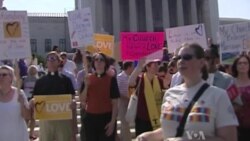CAPITOL HILL —
A bill to protect gay and trans-gendered Americans from workplace discrimination is expected to pass the Senate this week, but stall in the House of Representatives.The Employment Non-Discrimination Act - known as "ENDA" - is viewed by some as an overdue advance for civil rights, and by others as an unnecessary and unwise federal intrusion into the workforce.
Gay Americans have won the right to serve openly in the military and the right to marry in a growing number of states. But many are still fearful at their jobs, according to activist Sarah Warbelow.
“They [gays] want to be judged on the basis of their skills, their talents and their efforts, not on the basis of their sexual orientation or gender identity,” she said.
In most U.S. states, a worker can be denied a job or fired because he or she is gay or trans-gendered. ENDA would ban such discrimination nationwide with exemptions for religious organizations. The bill has the backing of President Barack Obama and all Senate Democrats, including Tom Harkin.
"Too many of our fellow-citizens are being judged, not by what they can contribute to the workplace, but by whom they are and who they choose to love,” said Harkin.
Susan Collins is among a small group of Republican senators supporting ENDA. "The right to work is fundamental. How can we in good conscience deny that right to any LGBT [Lesbian, Gay, Bisexual, Trans-gendered] American who is qualified and willing to work?”
Senate ENDA opponents have been largely silent. But in the Republican-led House of Representatives, Speaker John Boehner issued a statement saying the bill would encourage frivolous lawsuits and harm job creation. ENDA is unlikely to get a House vote absent Boehner’s support.
Some argue anti-discrimination laws can backfire by making employers fearful of the very groups the measures seek to protect.
Analyst Walter Olson said, “For example, age discrimination law was intended to make it easier for older workers in the workforce. In practice, problems of older workers have gotten worse since that law was passed. And one reason is that they are seen as legally dangerous by employers [who worry] 'Gee, if they do not work out, they are a walking lawsuit'."
Olson added that Americans already have become far more accepting of gay people, making ENDA unnecessary.
The Senate’s only openly-gay member, Tammy Baldwin, said the measure will ensure dignity in the workplace "We [gay people] want to live in a country where we are respected for who we are. Where we enjoy freedom and opportunity because that is who we are as Americans."
Current federal law already protects workers on the basis of race, religion, national origin, age and disability.
ENDA was initially championed by former Democratic Senator Edward Kennedy in the 1990s. Political observers say many lawmakers now willing to cast votes for gay rights would not have done so just a decade ago.
Gay Americans have won the right to serve openly in the military and the right to marry in a growing number of states. But many are still fearful at their jobs, according to activist Sarah Warbelow.
“They [gays] want to be judged on the basis of their skills, their talents and their efforts, not on the basis of their sexual orientation or gender identity,” she said.
In most U.S. states, a worker can be denied a job or fired because he or she is gay or trans-gendered. ENDA would ban such discrimination nationwide with exemptions for religious organizations. The bill has the backing of President Barack Obama and all Senate Democrats, including Tom Harkin.
"Too many of our fellow-citizens are being judged, not by what they can contribute to the workplace, but by whom they are and who they choose to love,” said Harkin.
Susan Collins is among a small group of Republican senators supporting ENDA. "The right to work is fundamental. How can we in good conscience deny that right to any LGBT [Lesbian, Gay, Bisexual, Trans-gendered] American who is qualified and willing to work?”
Senate ENDA opponents have been largely silent. But in the Republican-led House of Representatives, Speaker John Boehner issued a statement saying the bill would encourage frivolous lawsuits and harm job creation. ENDA is unlikely to get a House vote absent Boehner’s support.
Some argue anti-discrimination laws can backfire by making employers fearful of the very groups the measures seek to protect.
Analyst Walter Olson said, “For example, age discrimination law was intended to make it easier for older workers in the workforce. In practice, problems of older workers have gotten worse since that law was passed. And one reason is that they are seen as legally dangerous by employers [who worry] 'Gee, if they do not work out, they are a walking lawsuit'."
Olson added that Americans already have become far more accepting of gay people, making ENDA unnecessary.
The Senate’s only openly-gay member, Tammy Baldwin, said the measure will ensure dignity in the workplace "We [gay people] want to live in a country where we are respected for who we are. Where we enjoy freedom and opportunity because that is who we are as Americans."
Current federal law already protects workers on the basis of race, religion, national origin, age and disability.
ENDA was initially championed by former Democratic Senator Edward Kennedy in the 1990s. Political observers say many lawmakers now willing to cast votes for gay rights would not have done so just a decade ago.





